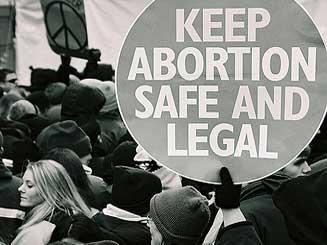
Shout it.
On May 20th, the Oklahoma Legislature passed a bill that would criminalize abortion by revoking abortion doctors’ medical licenses. Oklahoma State Senator Nathan Dahm, who authorized the bill, defended his decision by stating, “Those rights begin at conception.”
This position is in direct violation of Roe v. Wade and therefore unconstitutional according to many — including Oklahoma Governor Mary Fallon who vetoed the bill. While the bill is technically no longer in action, many people are outraged that it even made it the Governor’s desk and are further concerned that the fight still may not be over: Dahm is reportedly considering overriding the veto and hopes to challenge Roe v Wade.
This situation is hardly an anomaly. Dahm is just one of far too many legislators who have used the excuse of a “pro-life” ideology to thwart women’s reproductive rights. In fact, the Susan B. Anthony list — an organization devoted to making sure “pro-life Americans know where their lawmakers stand on protecting the unborn, and in issue advocacy, advancing pro-life laws through direct lobbying and grassroots campaigns,” according to its website — has even created an entire hub of candidate devoted to these values.
But if legislators are really concerned with reducing abortion they might consider moving beyond their personal beliefs and looking at the evidence. The truth is, abortion in the United States has actually been decreasing since 1997. Between 2003 and 2012, the number, rate and ratio of abortions decreased 17%, 18%, and 14%, respectively, according to the CDC. The teenage pregnancy rate also dropped 40% from 1990 to 2005, and even hit a historic low of 70.6 per 1,000 women aged 15-19, according to the CDC.
This downturn is likely based on many factors. The rate is likely rooted in multiple, different groups of women, such as those who can’t access abortions as well as those who don’t want them, as the Atlantic noted. But another crucial reason is that women also don’t get abortions when they have access to contraception — and are generally empowered and trusted to make their own reproductive decisions. As William Saletan wrote in Slate, “The decline in the number of abortions, relative to the overall number of women aged 15 to 44, was due to a reduction in pregnancies, not to pregnant women choosing life.”
But one factor that likely did not influence the decline? Politicians’ efforts to undermine women and restricting their rights. When women need an abortion, they will find a way to get one — even if that means traveling because their state’s politicians have made it effectively inaccessible. As Sarah Erdreich, author of Generation Roe: Inside the Future of the Pro-Choice Movement, told Mic, “numbers go down in the state where you have those restrictions, but that doesn’t mean that women won’t try and find other ways to find an abortion if that’s what they feel they need to do, and you see that in the rise of abortions in neighboring states.”
Ultimately, I cannot prescribe my beliefs to others, but I can explain why I hold the beliefs I do. I’m pro-choice because I trust women and believe that they should have the power to control their own reproductive systems and enjoy protection under the Constitution as well as their basic human rights. I am pro-choice because I believe that women’s lives matter and they should be able to make the best decision about a pregnancy for their body, health, and life. I am pro-choice because I believe that children should be wanted — and never a punishment or a regret.

